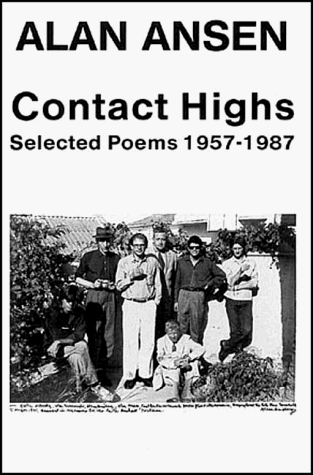Alan Ansen, Disorderly Houses: A Book Of Poems, Literary Licensing, LLC, 2012. (Wesleyan University Press, 1961.)
"It would not be accurate to call Mr Ansen a 'beat' poet, although he has something of the disenchanted attitude and the freedom of language of that school" (from the jacket notes.)

Alan Ansen, Contact Highs: Selected Poems, 1957-1987, Dalkey Archive Press, 1989.
"Alan Ansen's first book," James Merrill has noted, "Disorderly Houses (1961), dedicated to both W. H. Auden and William Burroughs, was also his last to be published commercially. Since then this prolific and unpredictable poet's work has been available only in editions of his own devising, distributed to friends at his own caprice. As one of the happy few, I can report that his gifts remain as brightly unnerving as ever."
Though perhaps best known as the model for some of the most flamboyant characters in Beat fiction (Rollo Greb in Kerouac's On the Road, A. J. in Burroughs's Naked Lunch, Dad Deform in Corso's American Express) and as Auden's secretary (he helped Auden with the syllabification of The Age of Anxiety), Alan Ansen is an accomplished poet in his own right. Having affinities with both the Beats and the New York school of poets, Ansen fuses Beat sensibility with formalist rigor. Contact Highs is the first comprehensive collection of his poetry, and includes a biographical introduction, an afterword by poet Rachel Hadas, and a bibliography of Ansen's elusive works.
This collection, gathering 30 years of work by American expatriate Ansen ( Disorderly Houses ), careens in voice from a tone of bravado--an unwavering insistence on seeing the universe in all its mockery and injustice--to one of unabashed tenderness. And such conflict implies the poetry's central tension: a desire to be immersed in life's drama, rather than merely to judge it. Ansen, who has lived in Greece for the past 25 years, is a vivid creator of worlds with words, but never too sober in his verbal wizardry. Sly and wild in the manner of Gregory Corso or Allen Ginsberg, the poet marries exultant anarchy to traditional forms. Dismissing "shameless lyrists" who "warble their hearts' content,"sic, 95 like an "eerie oddity" Ansen "retails his uniqueness" with some bitterness but more brio, and many readers will be grateful. - publishers weekly
Though relatively unknown, Ansen has been a real actor in literary history for the past 30 years. As amanuensis to Auden, his origins are steeped in formalism. His subsequent introduction to Ginsberg and company radically altered his course. A thinly disguised figure in several of Kerouac's novels, he did drugs with Corso and was very close to Burroughs, and his poetry reflects this wonderfully checkered past. The styles range from the drug-induced "Heroin" through a sestina dedicated to Ashbery to Audenesque formalism that rhymes. Whatever the styles, the cadences are powerfully relentless and informed by an intellectual complexity rare today. As witty as O'Hara, Ansen also plunges into the depths of the human condition. This may be one of the more significant poetry publications of the decade; four stars.- Ivan Arguelles

Alan Ansen, The Table Talk of W.H. Auden, Ontario Review Press, 1990.
In New York, between 1946 and 1948, the scholar and poet Alan Ansen made rapid notes of Auden's inimitable conversation. This book is a record of Auden's private, offhand and sometimes wayward remarks and opinions about art, literature, music, politics, religion and sexuality.
This is the second volume of the late poet's reported speech. The first, Conversations with Auden by Howard Griffin and edited by Donald Allen, appeared from Grey Fox Press in 1981. The collectors of both appear to have kept in mind the famous example of Johann Peter Eckermann's Conversations with Goetbe in the Later Years of His Life, with the interviewer playing a minor role and letting the great man hold forth at length. Neither is a collection of verbatim interviews; both were accomplished before the use of the tape recorder. Of the two, Ansen's book is the more wide-ranging and accurate in capturing Auden's wit and speech. Whereas Griffin's book is largely political and literary, Ansen displays Auden's knowledge of such disparate subjects as pumping stations, murders, cats, classical and jukebox music, arithmetic textbooks, the Vatican, and coal mines. Often his opinions are outrageous: Mozart's music does not hold up well, Thomas Jefferson was a great bore, and Yeats's last poems are merely competent. But throughout one senses Auden was a good and honest man: "I think that poetry is fundamentally frivolous," he says. "I do it because I like it. The only serious thing is loving God and your neighbor." If one agrees with Auden's critical intent, that "criticism should be a casual conversation," this slender volume is an illuminating and vital document. -- From Independent Publisher

Alan Ansen passed away in Athens, Grece on November 12, 2006. A poet, playwright, and author, he was associated with both the Beat Generation & New York poets. Ansen served as secretary to W.H. Auden for a number of years.
Ansen inspired the character Rollo Greb in On the Road, and other of Kerouac’s characters as well. Living in Tangier, he spent time with Paul Bowles, Burroughs, Allen Ginsberg in others. He was based in Greece for about the last 40 years of his life.
Speaking to John Barbato several years ago, Ted Joans said of Ansen, “Once upon a time there was a whole bevy of Beats and now there’s only a few. There’s Alan Ansen in Athens, Greece, who people don’t know very well. Without Alan Ansen there would be no William Burroughs…” Read more…

No comments:
Post a Comment
Note: Only a member of this blog may post a comment.